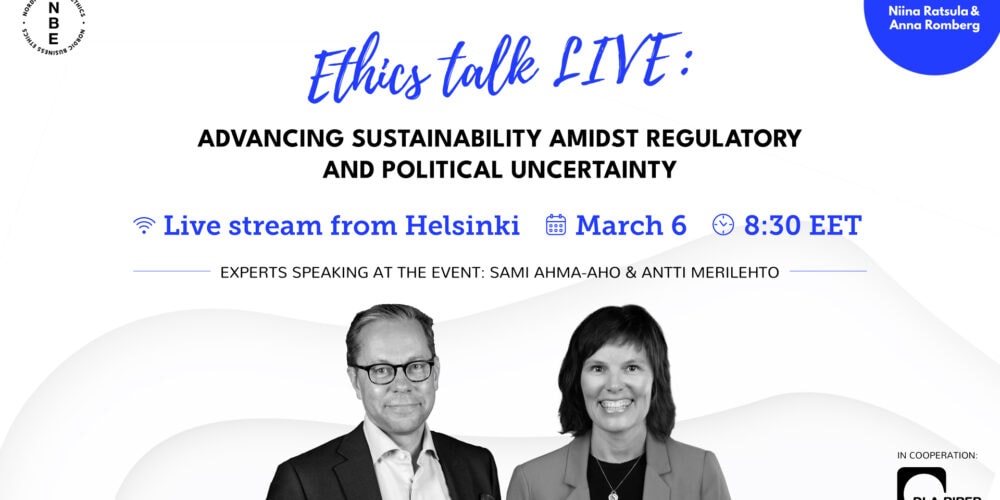EthicsTalk LIVE: Book club with Richard: THE BEHAVIORAL CODE AND THE HIDDEN WAYS THE LAW MAKES US BETTER. . . OR WORSE! A LIVE DISCUSSION WITH CO-AUTHOR PROFESSOR BENJAMIN VAN ROOIJ
On May 25th in Stockholm, Hayaat Ibrahim, Secretary-General of the Swedish Anti-Corruption Institute, and Richard Bistrong, CEO, Front-Line Anti-Bribery, interviewed Professor Benjamin Van Rooij, co-author (with Professor Adam Fine) of The Behavioral Code: The Hidden Ways The Law Makes Us Better. . . Or Worse and Anna Romberg, EVP of Sustainability, Legal & Compliance at Getinge and Co-Founder (with Niina Ratsula) of the Nordic Business Ethics Network. This blogpost by Richard Bistrong summarises the highlights of the discussion. If you want more, please watch the recording from our YouTube channel.
Should we get paid even more to do the right thing?
In Benjamin’s opinion poorly designed incentives can lead to structural misconduct, for example, setting goals that are not achievable, referencing the Wells Fargo ‘new account’ scandal. Benjamin also added how incentives and sanctions are not useful where you don’t know what is actually going on in the field- after all, if you don’t have data on conduct, how can you address decision-making? The challenge, as Benjamin shared, is how compliance leaders are not in charge of ‘targets,’ yet they can voice to their business colleagues the compliance implications of unrealistic targets.
Anna asked if we have properly challenged ourselves about what would happen if we reduced our reliance on financial targets. Can we move away from financial legacies with a mindset shift? Benjamin added that if the Boards are not more sensitive to long-term thinking, it will be difficult to move off of short-term goals. We also talked about psychological safety and incentives- in how people need to understand what happens if they don’t meet their targets, as that will drive behavior when people are clear about ‘worst case’ consequences if they fail to meet their goals. Therefore, the question to ask, is
Are people feeling safe to speak up if they feel that their targets are unachievable?
How much uncomfortability do you tolerate?
The Behavioral Code also speaks to how people can act unethically and badly without doing so intentionally. Benjamin shared the dynamics behind “bounded ethicality,” addressing how we are not making conscious decisions when confronting ethical dilemmas, and how “we overestimate on how ethical we are and when we look back on our behavior, we overestimate again.” Benjamin seemed to downplay the impact of “ethical dilemma” workshops, as that is not how we respond in the real world, where our decision-making is quite automated.
So, what are the solutions to nudge teams out of automated thinking in high-risk situations, and not acting on auto-pilot? One intervention that Benjamin referenced was to have a decision-making deliberation partner to slow down thinking to which Anna added that it is critical not to pair someone who might be inclined toward ‘consensus’ and to make sure it’s someone that would encourage ‘friction’ in decision making. As she said, “We don’t want cozy decision-making, it should feel uncomfortable.”
Is 100% ethicalness realistic?
One of Benjamin’s arguments is that teams that are doing what’s right might be getting mixed signals when we excessively communicate about misconduct, where such ethical employees might think that certain bad behaviors are normal, which can undermine both deterrence and ethical conduct.
Anna mentioned that “If you think you are ethical 100% of the time you are unethical” as it’s impossible to be always ethical, there are always blind spots. Additionally, she warned us about the dangers of a “it could never happen here” mindset.
In sum, both Benjamin and Anna encouraged us to ‘ask the right questions’ to our business peers, leaders, and front-line teams to better understand how we can drive better outcomes, values, and corporate culture and to stay away from false comfort by challenging ourselves and one another.
If you want more of the same topic, make sure you watch the webinar recording from Nordic Business Ethics’ YouTube channel.



